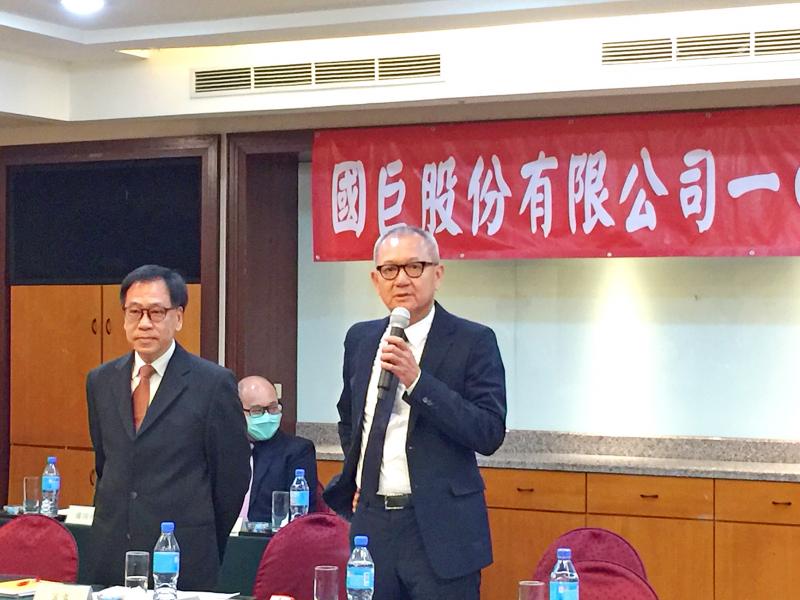Yageo Corp (國巨), the world’s third-largest maker of multilayer ceramic capacitors, yesterday said that although order visibility for next quarter is vague, it is stepping up restocking in preparation for demand after the COVID-19 pandemic ends.
The company has forecast double-digit percentage quarterly revenue growth this quarter on recovering customer demand, but is uncertain whether the momentum would extend into the second half of the year.
“Because of the pandemic, we do not have clear visibility for the third quarter,” Yageo chairman Pierre Chen (陳泰銘) told reporters on the sideline of the company’s annual shareholders’ meeting in New Taipei City’s Shenkeng District (深坑).

Photo: Lisa Wang, Taipei Times
“I believe Yageo’s revenue and profit will continue to grow after combining [revenue] from Kemet Corp starting from July,” Chen said.
Kemet, based in Fort Lauderdale, Florida, manufactures passive components.
The company’s revenue is 20 percent less than Yageo’s, but it has a better profit margin, given its rich product portfolio in the automotive and national defense sectors, as well as industrial and medical devices, Yageo said.
As they are niche products, the acquisition of Kemet would help Yageo ride volatility in the consumer electronics industry, Chen said.
Yageo would continue scouting for merger and acquisition opportunities to expand its global sales channels and to enhance its technological capabilities, Chen said.
More than 60 percent of Yageo’s revenue came from consumer electronics, smartphones in particular, he said.
Yageo’s priority is to restock, he said.
“We cannot install capacity until [demand outlook] becomes clear. We have to plan ahead,” Chen said. “We are hoping to increase inventory to healthy levels, which is about 100 to 110 days. We are still far from that.”
The company aims to increase inventory to between 50 and 60 days by the end of this quarter by doubling its capacity utilization to about 60 percent, compared with a trough of 30 percent in February, Yageo said.
Yageo would not relocate production capacity out of China, despite trade difficulties and a technology race between Washington and Beijing, it said.
China remains its manufacturing hub, providing 70 percent of manufacturing capacity, it said.
However, Yageo is building new research and development, and high-end product capacity in Taiwan, it said.
“Taiwan will be Yageo’s manufacturing and R&D center for high-end products,” Chen said.
Yageo plans to invest NT$31.2 billion (US$1.05 billion) to expand production capacity at its plants in Kaohsiung’s Dashe (大社) and Nanzih (楠梓) districts, it said.
Moreover, it is setting up a research and development center, and has started construction of a new plant at the Dafa Industrial Park (大發工業區) in Kaohsiung’s Daliao District (大發), which would create about 1,900 jobs, the company said.

RUN IT BACK: A succesful first project working with hyperscalers to design chips encouraged MediaTek to start a second project, aiming to hit stride in 2028 MediaTek Inc (聯發科), the world’s biggest smartphone chip supplier, yesterday said it is engaging a second hyperscaler to help design artificial intelligence (AI) accelerators used in data centers following a similar project expected to generate revenue streams soon. The first AI accelerator project is to bring in US$1 billion revenue next year and several billion US dollars more in 2027, MediaTek chief executive officer Rick Tsai (蔡力行) told a virtual investor conference yesterday. The second AI accelerator project is expected to contribute to revenue beginning in 2028, Tsai said. MediaTek yesterday raised its revenue forecast for the global AI accelerator used

TEMPORARY TRUCE: China has made concessions to ease rare earth trade controls, among others, while Washington holds fire on a 100% tariff on all Chinese goods China is effectively suspending implementation of additional export controls on rare earth metals and terminating investigations targeting US companies in the semiconductor supply chain, the White House announced. The White House on Saturday issued a fact sheet outlining some details of the trade pact agreed to earlier in the week by US President Donald Trump and Chinese President Xi Jinping (習近平) that aimed to ease tensions between the world’s two largest economies. Under the deal, China is to issue general licenses valid for exports of rare earths, gallium, germanium, antimony and graphite “for the benefit of US end users and their suppliers

Dutch chipmaker Nexperia BV’s China unit yesterday said that it had established sufficient inventories of finished goods and works-in-progress, and that its supply chain remained secure and stable after its parent halted wafer supplies. The Dutch company suspended supplies of wafers to its Chinese assembly plant a week ago, calling it “a direct consequence of the local management’s recent failure to comply with the agreed contractual payment terms,” Reuters reported on Friday last week. Its China unit called Nexperia’s suspension “unilateral” and “extremely irresponsible,” adding that the Dutch parent’s claim about contractual payment was “misleading and highly deceptive,” according to a statement

Artificial intelligence (AI) giant Nvidia Corp’s most advanced chips would be reserved for US companies and kept out of China and other countries, US President Donald Trump said. During an interview that aired on Sunday on CBS’ 60 Minutes program and in comments to reporters aboard Air Force One, Trump said only US customers should have access to the top-end Blackwell chips offered by Nvidia, the world’s most valuable company by market capitalization. “The most advanced, we will not let anybody have them other than the United States,” he told CBS, echoing remarks made earlier to reporters as he returned to Washington